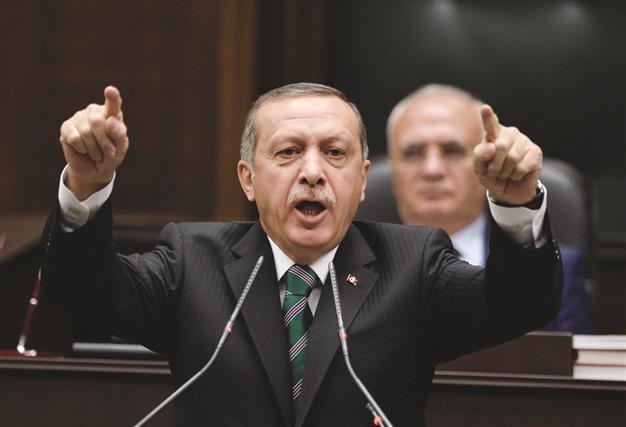Politicians hit below belt in Kurdish debate
ANKARA

The prime minister urges those who labeled his jargon in Diyarbakır as ‘separatist’ to read the minutes of the founding Parliament of 1920. DAILY NEWS photo / Selahattin SÖNMEZ
No stranger to recriminations in the fractious world of Turkish politics, Turkey’s Parliament was the site of added drama yesterday as the government and opposition parties vented their fury at each other over Prime Minister Recep Tayyip Erdoğan’s weekend visit to Southeast Anatolia.In a departure from the norm, Erdoğan was not the main source of frustration for opposition leaders yesterday, as Kurdistan Regional Government (KRG) leader Masoud Barzani and Kurdish singer Şivan Perwer – both of whom met Erdoğan in Diyarbakır on Nov. 16 – as well as late Kurdish singer Ahmet Kaya, were also the subject of either bitter criticism or praise from opposition leaders.
From the point of view of the opposition, the gathering in Diyarbakır was unsatisfactory and insincere or even amounted to treason.
For his part, Erdoğan stood solidly behind the approach he displayed in Diyarbakır regarding the Kurdish issue, while particularly using the term “Kurdistan” once more in apparent defiance against criticism by ultranationalists to his approach and language.
Furthermore, Erdoğan recalled that the Ottoman Empire used to call the Black Sea region “Lazistan,” while the founding Parliament of the Republic of Turkey used to call the southeastern Anatolian region “Kurdistan.” His remarks referring to the provincial administration of the Ottoman Empire are likely to spark yet another wave of criticism since they could be interpreted as a sign of Erdoğan’s desire to implement a federal system.
“A big state cannot be built with fear. Those who are afraid of words, of concepts, of taboos … cannot build a big state,” Erdoğan said, addressing his ruling Justice and Development Party (AKP) deputies.
The prime minister urged those who labeled his jargon in Diyarbakır as “separatist” to read the minutes of the founding Parliament of 1920.
“Then, was Mustafa Kemal a separatist, too? Were all the deputies at the time who used the word ‘Kurdistan’ separatists, too?” he asked, particularly targeting the Nationalist Movement Party (MHP). “Was the late Alparslan Türkeş, who said ‘We have a Kurdish son-in-law,’ a separatist, too?” he asked, referring to the founder of the MHP.
On Nov. 16, thousands gathered to hear Erdoğan and Barzani speak, opening a day of ceremonies including a performance by Perwer, who had fled Turkey in the 1970s, and a wedding of 400 couples.
In Diyarbakır, while welcoming Perwer, Erdoğan also cited Kaya, another iconic Kurdish musician who died 13 years ago to the day in forced exile after being demonized in Turkey for announcing that he would include a Kurdish song in a new album.
In Ankara, yesterday, Erdoğan maintained that those who at the time almost lynched Kaya and those who attacked the present government during the Gezi Park unrest were actually identical.
Halabja and Uludere
Main opposition Republican People’s Party (CHP) leader Kemal Kılıçdaroğlu praised Kaya and acknowledged that Perwer was a prominent singer who sang touching songs about sorrows of people, noting that he was always affected by Perwer’s song about the Halabja Massacre, in which over 5,000 Kurds were killed with poison gas by Saddam Hussein’s Iraqi government in 1988.
“Now I want to ask Şivan Perwer. How dare you could rhapsodize [Prime Minister] Recep Tayyip Erdoğan when he did not give an accounts about our 34 people killed in Uludere [in a botched air raid by Turkish jets in 2011]?” Kılıçdaroğlu told his deputies. “An artist should be against a tyrant, like Ahmet Kaya. You should be as brave as Ahmet Kaya.”
According to him, Erdoğan was exploiting Kaya by saying the late singer would side with the government.
“How can a dictator mention the name of Ahmet Kaya? If Ahmet Kaya – who was courageous and a revolutionary – was alive, he would side with the Gezi protesters and Erdoğan would be against Ahmet Kaya,” he said.
As expected, National Movement Party (MHP) leader Devlet Bahçeli was highly critical of the visit in Diyarbakır, although his remarks were much more strongly worded than usual.
“The prime minister did what his absent quality requires: He invited Barzani to Diyarbakır and embraced his counterpart like a ‘beloved person’ who is in love with his lover,” Bahçeli said in his well-known style.
Prisons and exile
Bahçeli also described Perwer and Kaya as “dissolute” friends of the outlawed Kurdistan Workers’ Party (PKK) who supported terrorism.
According to Peace and Democracy Party (BDP) co-leader Selahattin Demirtaş, the government was inconsistent with the approach it displayed in Diyarbakır.
“While you [Erdoğan] are shedding tears for artists [like Perwer], who lived in exile for years …, over 300 prisoners from Diyarbakır, Batman and Siirt prisons were sent to prisons in western cities that are hundreds of kilometers away from their families. While you say exiles should return back to their home on one hand, you send people into exile from their homelands on the other. Is this your way of emptying prisons?” Demirtaş said.
“Why are you emptying prisons in Diyarbakır, Batman and Siirt by sending the prisoners into exile? Some 322 prisoners were abruptly sent into exile on the same day [Erdoğan] was there. Are you opening space for new operations and new detainees? Will you maintain the resolution process with new political operations?” Demirtaş asked.
Despite touching upon the joint visit of Erdoğan and Barzani, Demirtaş took pains to not pronounce the name of the Iraqi Kurdish leader even once in his speech.
“The situations of prisons are important for us because we are the party of a movement which evolved from the resistance of Mazlum Doğan in Diyarbakır No. 5 prison,” Demirtaş said.
Doğan, one of the founders of the PKK, immolated himself in the notorious Diyarbakır Prison in 1982 in protest at the coup-era state’s inhuman treatment of political protesters.
















